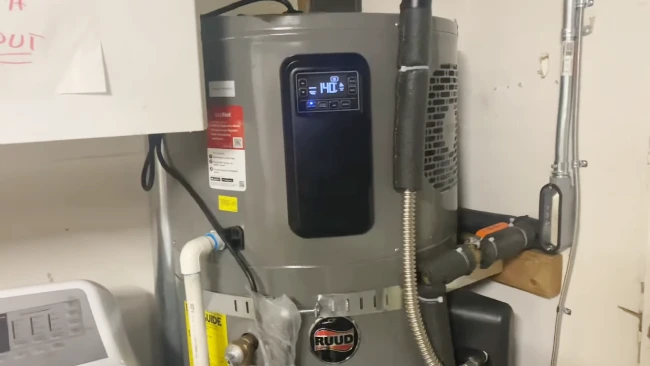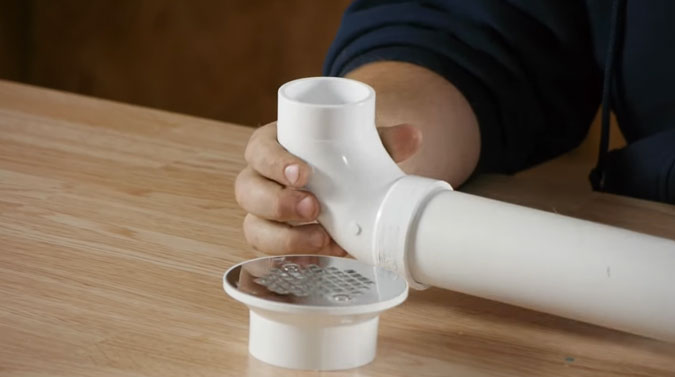Last Updated on June 26, 2023
Are you considering purchasing a heat pump water heater but wondering if it will be too noisy for your home?
It is true that heat pump water heaters, including hybrid models, produce some noise during operation. The noise primarily comes from the fan and compressor that transfer heat from the surrounding air to the water.
But, the noise level can vary depending on the specific model and manufacturer. Manufacturers continuously work to improve the design and reduce the noise levels of heat pump water heaters.
Some models incorporate noise-reducing features such as insulated cabinets, vibration dampeners, or variable-speed fans to minimize the sound produced.
Let’s talk about hushing up your heat pump water heater and how to detect any commotion that could signal trouble.
How Can You Make Your Heat Pump Water Heater Quieter?

If you want to make your heat pump water heater quieter, there are a few key strategies to consider. Here’s a quick overview:
4. Vibration Isolation Dampers
Let’s discuss this in more detail.
1. Fan and Motor Replacement
You can replace the fan and motor on a heat pump water heater or pool heat pump if it makes a lot of noise.
Newer, smoother-running fan and motor components can reduce the volume of your heat pump water heater. The fans and motors in older models tend to be louder and less efficient, which can contribute to a noisy water heater.
Replacing these components can reduce your unit’s decibel level and improve its overall performance and energy efficiency.
To make the most out of your fan and motor replacement, consider the following tips:
- Choose high-quality replacement components that are specifically designed for your heat pump water heater model.
- Hire a professional technician to install the new components and ensure they’re properly calibrated and adjusted for optimal performance.
- Keep your unit well-maintained by regularly cleaning and lubricating the fan and motor components.
- Monitor your energy consumption and bill to ensure that the replacement components improve your unit’s efficiency.
2. Clean and Inspect
Regularly inspecting and cleaning your heat pump water heater ensures optimal performance and reduces any excess noise. Debris, such as leaves or dirt, can accumulate and obstruct airflow, causing additional noise.
Loose screws or parts can also contribute to the noise, so you must clean the unit and ensure everything is secure.
When inspecting the unit, turn off the power and remove any debris you find. You can gently use a soft brush or cloth to clean the unit’s exterior. If there are any loose screws or parts, tighten them up.
3. Compressor Sound Blanket
Consider wrapping a compressor sound blanket around your compressor to reduce the noise it generates. These blankets are specifically designed for noise reduction and can be made of fiberglass, vinyl, or mass-loaded vinyl.
Here are some benefits of using a compressor sound blanket:
- Reduces noise levels by up to 80%
- Easy to install and remove
- Durable and able to withstand harsh weather conditions
- Compatible with most compressors
- Can improve the lifespan of your compressor by reducing wear and tear caused by vibration
Installing a compressor sound blanket allows you to enjoy a quieter environment without replacing your old compressor. These blankets are a cost-effective solution to noise pollution and can provide peace of mind for homeowners who live close to their heat pump water heater.
4. Vibration Isolation Dampers
Now that you know about compressor sound blankets, let’s talk about another way to reduce noise from heat pump water heaters: vibration isolation dampers.
These mounts are designed to absorb vibrations and prevent them from transferring to the surrounding area, effectively reducing noise caused by excessive vibration.
When a heat pump water heater runs, the compressor, and other components can create vibrations that travel through the unit and into the surrounding space.
This can result in a noisy environment, especially if the water heater is in a shared living space. By installing vibration isolation dampers on the compressor bolts, you can minimize the transfer of these vibrations and significantly reduce noise levels.
These mounts are a simple and effective solution that can make a noticeable difference in the overall noise level of your heat pump water heater.
5. Unit Replacement
Get a new unit with advanced noise-reducing features that will make you feel like you’re in a peaceful oasis when you’re tired of all the clanking and banging.
Replacing your old and noisy heat pump water heater with a new unit can offer a range of benefits beyond just reducing noise levels.
Here are some reasons why you should consider upgrading your old heat pump water heater:
- Newer models are designed with noise-reducing features and technologies that can significantly decrease operational noise.
- A new unit can offer better energy efficiency and lower utility bills.
- Upgrading to a new unit can also help you avoid costly repairs and maintenance associated with older units.
- Newer models often come with extended warranties, providing peace of mind and protection against unexpected breakdowns.
- A new heat pump water heater can help increase the overall value of your home, making it a smart investment in the long run.
What Types of Noise Could Indicate a Problem With Your Heat Pump Water Heater?

If you notice any unusual sounds emanating from your heat pump water heater, it may indicate a problem that needs to be addressed. Here’s a quick rundown:
4. Continuous Rattling or Vibrating
Let’s get into the details:
1. Loud Banging or Clanging
You need to address loud banging or clanging noises from your unit immediately, as it could indicate a serious issue requiring professional attention.
These noises could indicate a water hammer effect caused by high water pressure, which can strain your unit’s internal components and cause damage over time.
The loud noise is caused by the sudden stop of the water flow, which creates a shockwave that reverberates through the pipes and causes a banging or clanging sound. If there’s a loud noise, it could be a malfunctioning compressor.
Left unattended, these issues can lead to more serious problems, like a complete breakdown. Therefore, having a professional inspect your heat pump water heater is important to diagnose and address the specific issue causing the loud banging or clanging noise.
2. Hissing or Whistling
Hissing or whistling could indicate a refrigerant leak in your system. A refrigerant leak can negatively impact the performance and efficiency of your heat pump water heater.
This makes it crucial to address the issue promptly. Various factors, including age, poor installation, or damage to the system, can cause refrigerant leaks.
You must contact a qualified technician to inspect the system if you hear a hissing or whistling sound from your heat pump water heater.
Ignoring the issue can lead to increased energy bills, decreased efficiency, and potentially harmful environmental effects.
3. Grinding or Screeching
When the fan motor or bearings in your heat pump water heater are damaged, it can cause grinding or screeching noises that can be quite alarming.
Operating the unit in this condition can lead to further damage and safety hazards. You need to have a professional inspect and repair your unit as soon as possible to prevent further damage.
During the inspection, the technician will examine the fan motor and bearings to determine the cause of the noise.
Replace worn bearings if they cause a problem. If the issue is with the fan motor, it may need to be repaired or replaced entirely.
4. Continuous Rattling or Vibrating
Persistent rattling or vibrating noises from your heat pump water heater could indicate loose or damaged components within the unit.
Check for loose screws, panels, or pipes and tighten them if necessary. If the noise continues, it may indicate that professional assistance is required to diagnose and fix the issue.
5. Gurgling or Bubbling
The sound of gurgling or bubbling in your system can signal trapped air, hindering proper flow and efficiency. This can happen in any type of water heating system, including a heat pump water heater.
If left unchecked, this can reduce hot water output and increase energy consumption. To remedy this issue, it may be necessary to bleed or flush the system to remove any air pockets.
6. Excessive Fan Noise
If you’ve noticed gurgling or bubbling sounds in your heat pump water heater, it could indicate an issue with the system’s refrigerant. But if you’re experiencing excessive fan noise, it’s likely a different problem altogether.
This could be caused by several factors, such as a faulty fan motor, damaged fan blades, or debris obstructing the fan’s movement. To diagnose the issue, it’s best to call in a technician who can examine the unit and make any
What is the normal sound of a heat pump water heater?

It is completely normal for your heat pump water heater to emit a gentle hum or buzz as it transfers heat from the air to the water. The compressor and fan motors work together to create a flow of warm air that heats up the water.
You need to note that a heat pump water heater’s specific sound can vary depending on the system’s manufacturer, model, and age. Some models may make more noise than others, especially if they’re older or need to be properly maintained.
How noisy are heat pump water heaters?
Heat pump water heaters can produce noise levels ranging from 60 to 80 decibels (dB) or even higher, depending on their size and specific model.
Residential units usually have a noisy sound rating between 50 to 70 decibels (dBA), while commercial systems can go up to around 90 dBA.
To give you an idea of the noise level, a heat pump water heater’s sound falls within the range of normal conversation or typical household noises at the lower end. On the higher end, it can be compared to the sound of a hairdryer, vacuum cleaner, or noisy restaurant.
Do heat pump water heaters make noise all the time?
The noise level of a heat pump water heater is not constant and can vary based on its operation and specific circumstances. When the heat pump is actively running, it will generate noise as the compressor and fans operate to transfer heat from the surroundings to heat the water.
Once the desired water temperature is reached, the heat pump may cycle off or enter a standby mode, reducing noise. During this period, the heat pump may emit only a soft hum or no noise at all.
Keep Your Heat Pump Water Heater Running Smooth
You now know the truth about heat pump water heaters and their noise levels. If your heat pump is making more noise than usual, follow the steps that we discussed above to quiet it down.
By adding insulation to the pipes and surrounding area, you can reduce the noise level significantly. If the noise persists, it might indicate a problem with the unit.
Heat pump water heaters are not excessively noisy, so their benefits far outweigh any minor noise concerns. So don’t let a little noise deter you from investing in this energy-efficient, cost-effective option.
With proper maintenance and care, your heat pump water heater will provide you with hot water for a long time.


